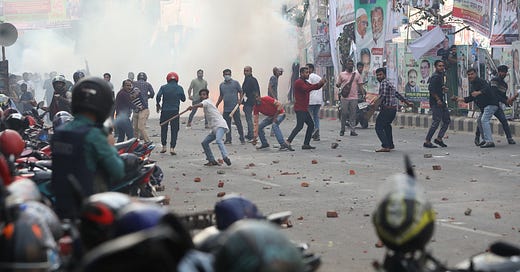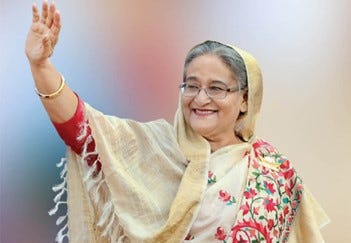Bangladesh awaits another chaotic national election
Polls not a spectator sport in Dhaka
By: Nava Thakuria
Bangladesh goes to general elections in January 2024 with the ruling Awami League seeking a renewed mandate from nearly 110 million voters to keep Prime Minister Sheikh Hasina in office for a fourth consecutive term. The current Sangsad, or parliament, is scheduled to expire on January 29, as the first session sat on January 30, 2019, with a tenure of five years. As always in Bangladesh, the upcoming election promises to be chaotic, with the Awami League government and its leader adamant against giving up power.
Despite a growing economic crisis and a perception that the Awami League has been in power too long after 13 years of uninterrupted rule, the principal opposition Bangladesh Nationalist Party today faces a difficult situation with its leader, the 78-year-old Begum Khaleda Zia continuing to be unwell and its acting chairperson Tarque Rahman exiled in London since 2008.
However, with inflation rising at an annual 8.61 percent clip after 6.15 percent in 2022 amid a cost-of-living crisis, tens of thousands of BNP supporters and others have been taking to the streets demanding the 75-year-old Hasina’s ouster, with police firing tear gas and rubber bullets at rioters blocking major Dhaka intersections. It is arguably the most serious political crisis Hasina has faced despite years of steady growth in which the government cut extreme poverty in half and achieved lower middle-income status under IMF direction, while providing shelter to thousands of Rohingya displaced by racial violence in neighboring Myanmar. Although violent protest has died down after a flareup in late July, it appears likely that it will well up again in the coming weeks.
Over the past decade, following the World Bank and other western development prescriptions, the country has made remarkable progress. The world’s eighth-most populous country, it has won praise for its social and economic headway. Widespread food shortages are a thing of the past, childhood mortality has fallen sharply, female literacy has risen to 73 percent and its per capita annual GDP, at the equivalent of US$2,458, has surpassed neighboring India’s at US$2,256. The share of women in the formal workforce has climbed from 4 percent at independence to 35 percent, largely due to its thriving garment export industry.
Increasing consumer spending, a young workforce, steady government spending, and a rapidly developing private sector are driving growth. The threat of radical Islamic menace seems to have receded. But despite that, its politics and civil rights environment remain circumscribed. Security forces have been implicated in serious abuses, including torture, extrajudicial killings, and enforced disappearances, according to the New York-based Human Rights Watch. “The notoriously abusive Rapid Action Battalion was sanctioned by the United States. The government has arrested journalists and critics under the Digital Security Act and otherwise stifled civil society, the NGO said in a recent report. Both Reporters Without Borders and the Committee to Protect Journalists have objected to attacks on the media.
BNP leaders, having good reason to fear the government will seek to rig the polls given past performance, are sticking to their demand for a neutral caretaker administration in Dhaka to conduct the forthcoming elections. The opposition alliance believes that the ruling coalition, battered by economic conditions and a perception of endemic corruption, would lose free and fair elections. Opposition leaders are yet to agree to participate in polls unless Hasina endorses a nonpartisan caretaker government to oversee the electoral process, which seems unlikely. Otherwise, they may boycott, as they did in the 2014 and 2018 national elections. But Hasina, now the world’s longest-serving female government head, has refused to step down prior to the elections, arguing that it’s not mandatory under the constitution.
The BNP and its allies, particularly Jamaat-e-Islami and other Islamist groups, are expected to go for more street protests across the country in the coming days, with many demonstrators possibly opting to adopt violent means to gain national and international media attention. The turmoil is likely to continue beyond the polls if the opposition alliance boycotts. The danger is that intense and uninterrupted political chaos runs the risk of inviting ‘men in uniform’ to step in, with another strongman emerging, as has happened in the past. Bangladesh has a history of military interventions in politics.
With the opposition sitting out the polls, the Awami League alliance won more than 250 parliamentary seats in the 2018 elections and thus enjoys an absolute majority in the 350-member Jatiya Sangsad, the highest legislative body. The country doesn’t have provincial legislative assemblies as in India or Pakistan. Hasina. the daughter of the late Bangabandhu Sheikh Mujibur Rahman – who is respected as Bangla’s Father of the Nation – still enjoys a reputation as an influential leader and lately gained more political mileage after the special invitation from New Delhi to attend the G20 summit. She was the only other South Asian government head to participate in the occasion and enjoyed a bilateral discussion with her host Indian counterpart Narendra Modi.
Over the years, the US government and many other western nations have repeatedly urged Hasina to hold transparent elections in which all opposition parties can participate and electors can vote freely. Recently US and UK diplomats met the Bangladesh chief election commissioner and other officials to enquire about the poll preparations. European Union leaders are planning to send election observers to Bangladesh, although the Awami League government argued that its Election Commission is capable enough to run the exercise honestly and independently.
After more than 175 global leaders including Nobel laureates, elected officials, and business and civil society leaders issued a statement that the two previous elections lacked legitimacy, Hasina hit back at suggestions that they should send international election experts to observe the polls. In reality, the general elections following Bangladesh’s transformation into a parliamentary democracy from the clutches of military rulers in 1990-91 have usually been characterized by enormous chaos and violence. The BNP tried to manipulate the 1996 elections, but it had to succumb to massive public protests. The endemic electoral chaos has given birth to the idea of an election-time caretaker government, which Hasina seems to be ignoring.
Then there is Hasina’s vendetta against the economist Muhammad Yunus, who was awarded the Nobel Prize for his development of microlending to the poor, which has transformed the lives of millions. In an open letter, former United Nations General Secretary Ban Ki-moon, Barack Obama and Hillary Rodham Clinton (former US President and secretary of State respectively), Shirin Ebadi, Orhan Pamuk with 100 other Nobel laureates, Infosys founder Narayana Murthy and others urged Hasina to suspend legal proceedings against Yunus. Commenting on Bangladesh’s progress in education, health, poverty alleviation, women empowerment, etc. since its independence in 1971, they expressed concern over the deteriorating scenario for human rights and media freedom.
Recently speculation has arisen that the combined opposition parties may project Yunus as their leader in the January elections. That seems unlikely. In 2007, Yunus toyed with the idea of starting a party named Nagarik Shakti (people’s power), but he soon abandoned the idea, citing non-cooperation by other electoral interests. He later maintained that he would not join into party politics. However, the aborted move earned Hasina’s continuing enmity. Soon after returning to power in 2008, she started a series of probes against him, accusing him of receiving money from foreign organizations including royalties from his books without informing the government. He was later charged with a list of violations that appeared to be manufactured by the government. Given his statements that he has no desire to reenter politics, combined with the continuing attacks by Hasina, it seems unlikely he would reverse himself.





Another failed state with failed policies. Hence people turn to religion for comfort which in turn is used as a gathering politically. Vicious cycle.